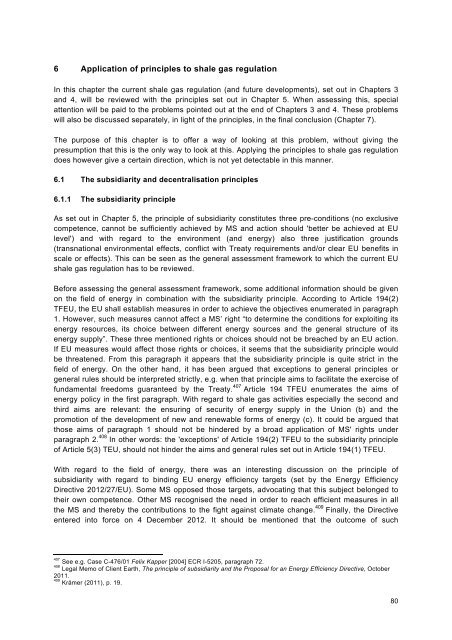Thesis-Anne-Vos-Masters-SBR-and-EU-Law-3
Thesis-Anne-Vos-Masters-SBR-and-EU-Law-3
Thesis-Anne-Vos-Masters-SBR-and-EU-Law-3
Create successful ePaper yourself
Turn your PDF publications into a flip-book with our unique Google optimized e-Paper software.
6 Application of principles to shale gas regulation<br />
In this chapter the current shale gas regulation (<strong>and</strong> future developments), set out in Chapters 3<br />
<strong>and</strong> 4, will be reviewed with the principles set out in Chapter 5. When assessing this, special<br />
attention will be paid to the problems pointed out at the end of Chapters 3 <strong>and</strong> 4. These problems<br />
will also be discussed separately, in light of the principles, in the final conclusion (Chapter 7).<br />
The purpose of this chapter is to offer a way of looking at this problem, without giving the<br />
presumption that this is the only way to look at this. Applying the principles to shale gas regulation<br />
does however give a certain direction, which is not yet detectable in this manner.<br />
6.1 The subsidiarity <strong>and</strong> decentralisation principles<br />
6.1.1 The subsidiarity principle<br />
As set out in Chapter 5, the principle of subsidiarity constitutes three pre-conditions (no exclusive<br />
competence, cannot be sufficiently achieved by MS <strong>and</strong> action should 'better be achieved at <strong>EU</strong><br />
level') <strong>and</strong> with regard to the environment (<strong>and</strong> energy) also three justification grounds<br />
(transnational environmental effects, conflict with Treaty requirements <strong>and</strong>/or clear <strong>EU</strong> benefits in<br />
scale or effects). This can be seen as the general assessment framework to which the current <strong>EU</strong><br />
shale gas regulation has to be reviewed.<br />
Before assessing the general assessment framework, some additional information should be given<br />
on the field of energy in combination with the subsidiarity principle. According to Article 194(2)<br />
TF<strong>EU</strong>, the <strong>EU</strong> shall establish measures in order to achieve the objectives enumerated in paragraph<br />
1. However, such measures cannot affect a MS’ right “to determine the conditions for exploiting its<br />
energy resources, its choice between different energy sources <strong>and</strong> the general structure of its<br />
energy supply”. These three mentioned rights or choices should not be breached by an <strong>EU</strong> action.<br />
If <strong>EU</strong> measures would affect those rights or choices, it seems that the subsidiarity principle would<br />
be threatened. From this paragraph it appears that the subsidiarity principle is quite strict in the<br />
field of energy. On the other h<strong>and</strong>, it has been argued that exceptions to general principles or<br />
general rules should be interpreted strictly, e.g. when that principle aims to facilitate the exercise of<br />
fundamental freedoms guaranteed by the Treaty. 407 Article 194 TF<strong>EU</strong> enumerates the aims of<br />
energy policy in the first paragraph. With regard to shale gas activities especially the second <strong>and</strong><br />
third aims are relevant: the ensuring of security of energy supply in the Union (b) <strong>and</strong> the<br />
promotion of the development of new <strong>and</strong> renewable forms of energy (c). It could be argued that<br />
those aims of paragraph 1 should not be hindered by a broad application of MS' rights under<br />
paragraph 2. 408 In other words: the 'exceptions' of Article 194(2) TF<strong>EU</strong> to the subsidiarity principle<br />
of Article 5(3) T<strong>EU</strong>, should not hinder the aims <strong>and</strong> general rules set out in Article 194(1) TF<strong>EU</strong>.<br />
With regard to the field of energy, there was an interesting discussion on the principle of<br />
subsidiarity with regard to binding <strong>EU</strong> energy efficiency targets (set by the Energy Efficiency<br />
Directive 2012/27/<strong>EU</strong>). Some MS opposed those targets, advocating that this subject belonged to<br />
their own competence. Other MS recognised the need in order to reach efficient measures in all<br />
the MS <strong>and</strong> thereby the contributions to the fight against climate change. 409 Finally, the Directive<br />
entered into force on 4 December 2012. It should be mentioned that the outcome of such<br />
407<br />
See e.g. Case C-476/01 Felix Kapper [2004] ECR I-5205, paragraph 72.<br />
408<br />
Legal Memo of Client Earth, The principle of subsidiarity <strong>and</strong> the Proposal for an Energy Efficiency Directive, October<br />
2011.<br />
409<br />
Krämer (2011), p. 19.<br />
80



